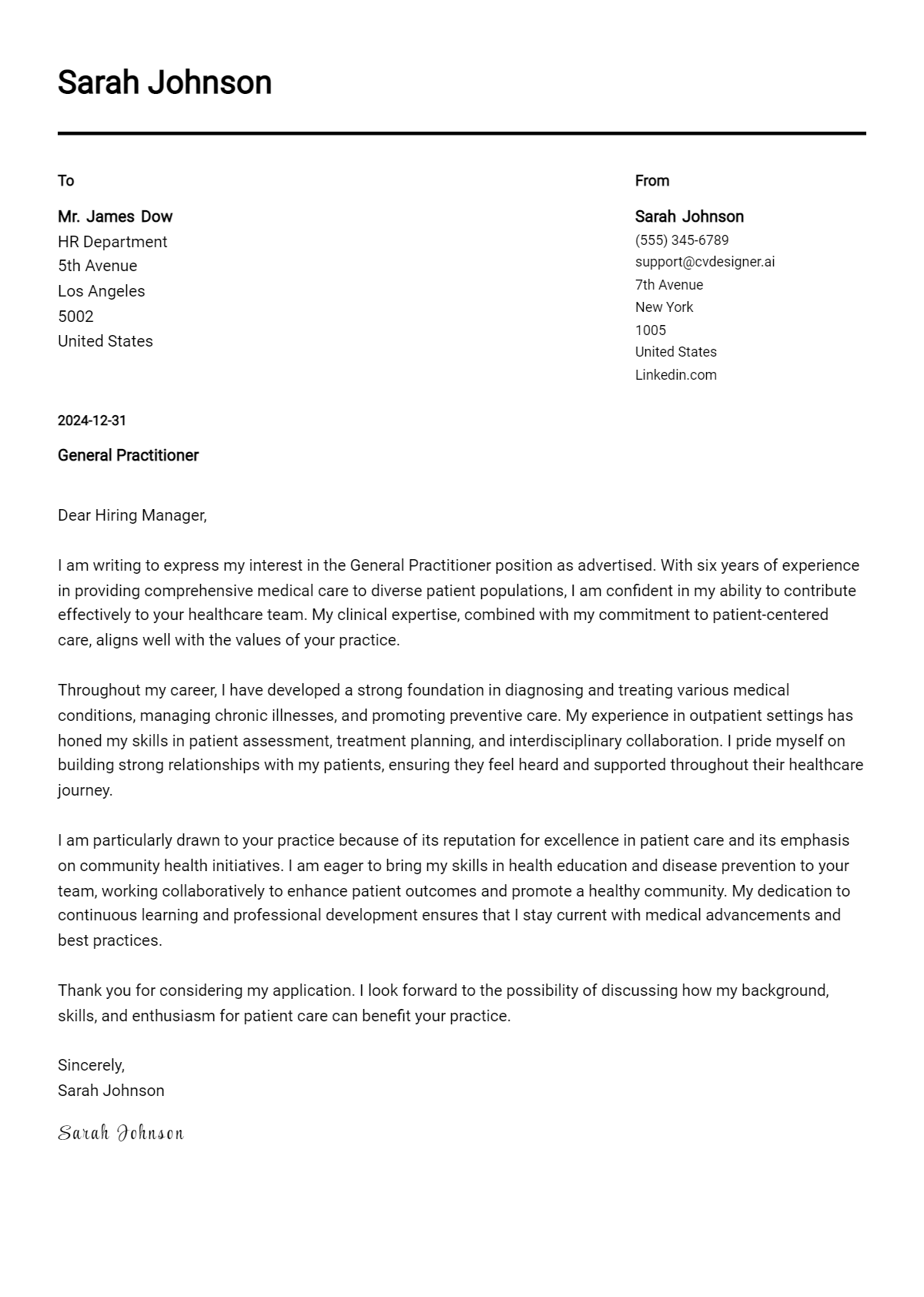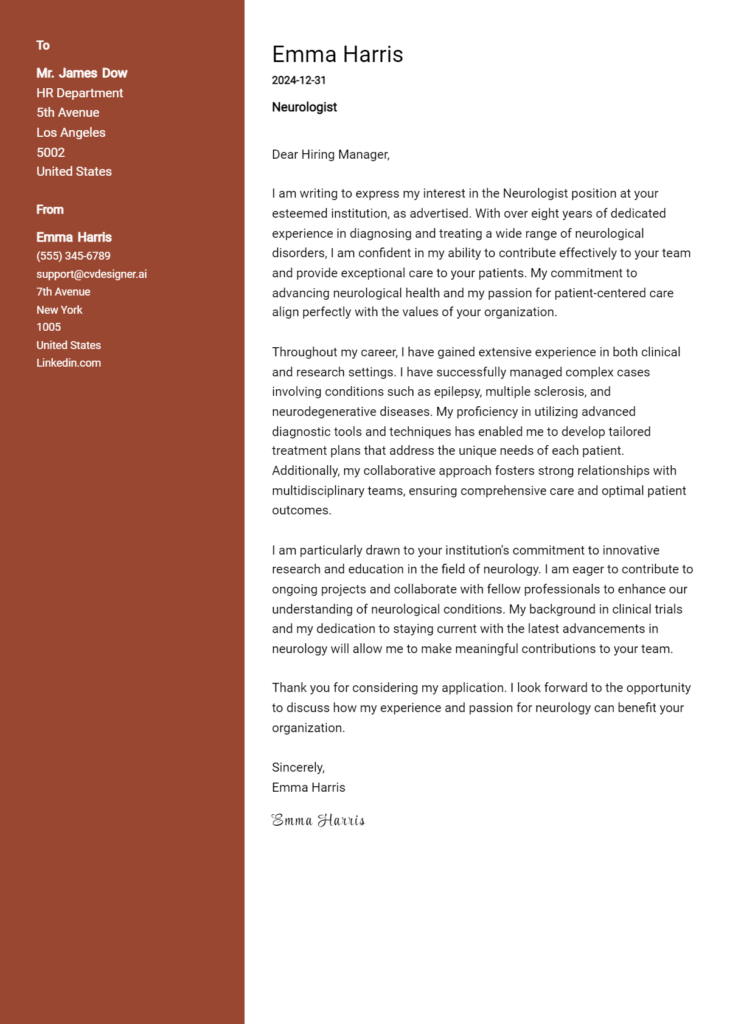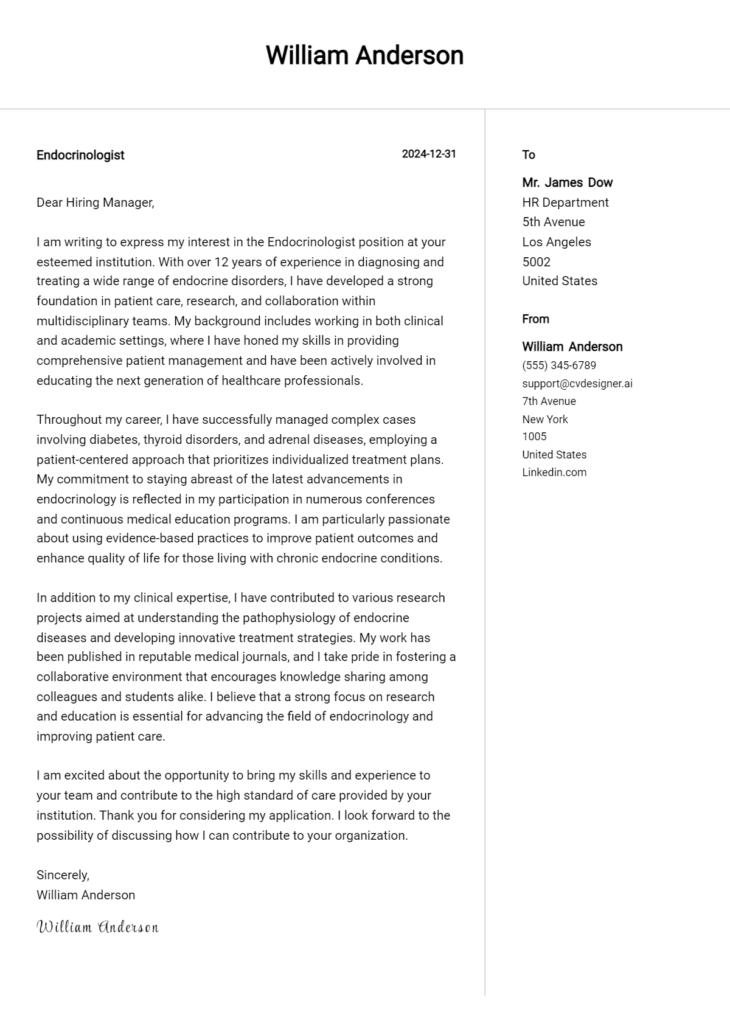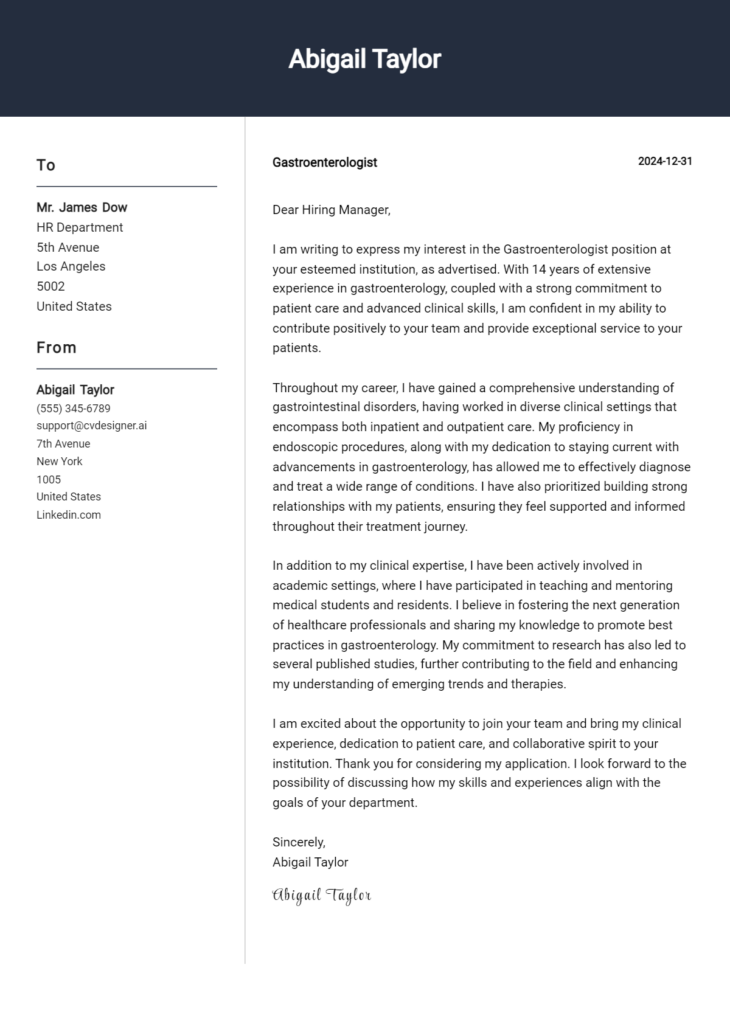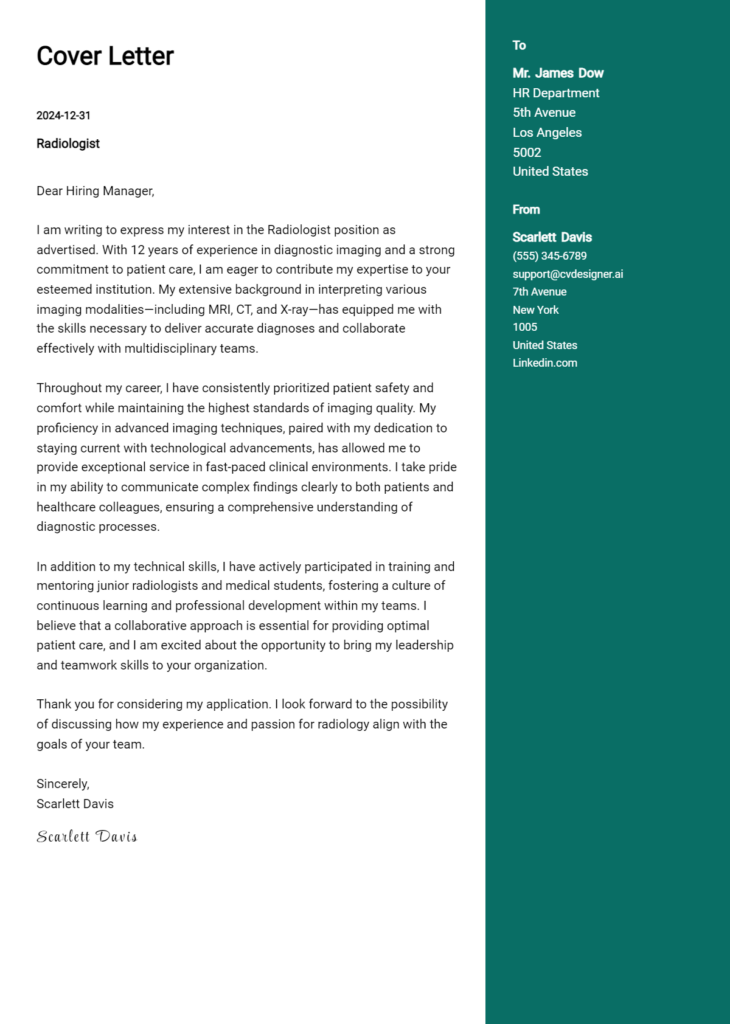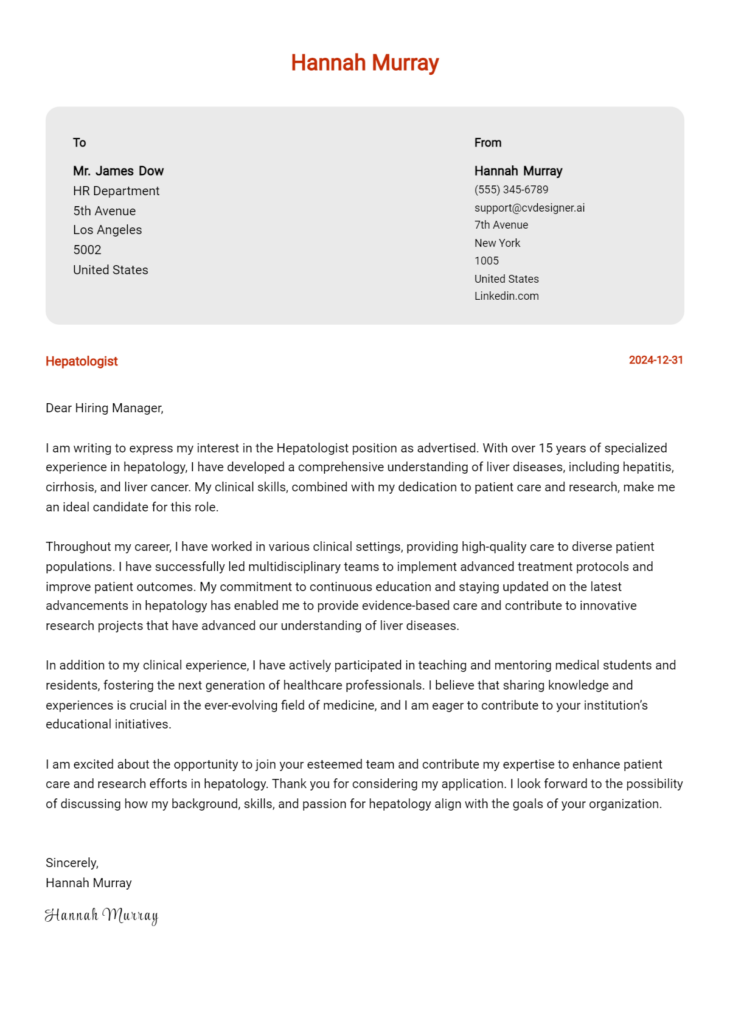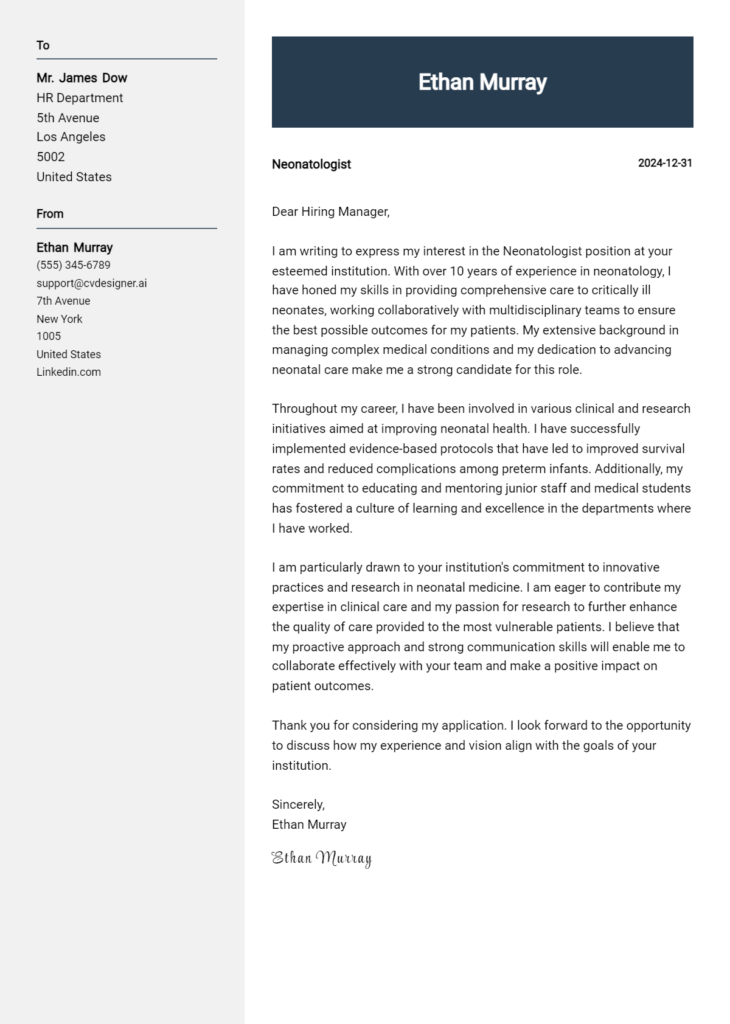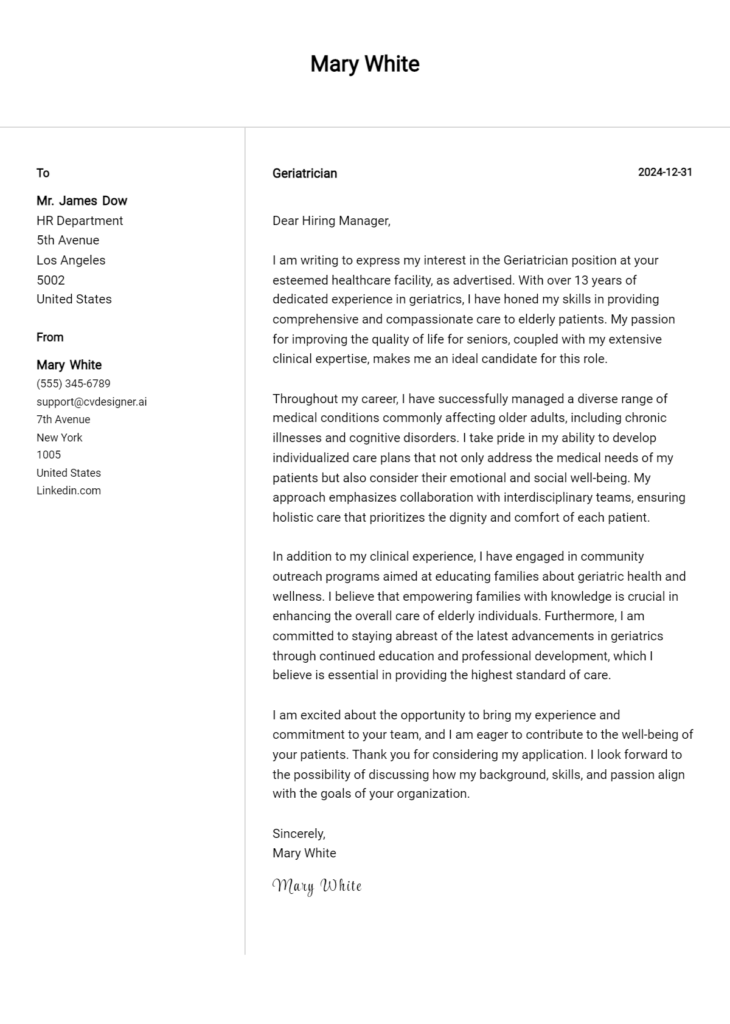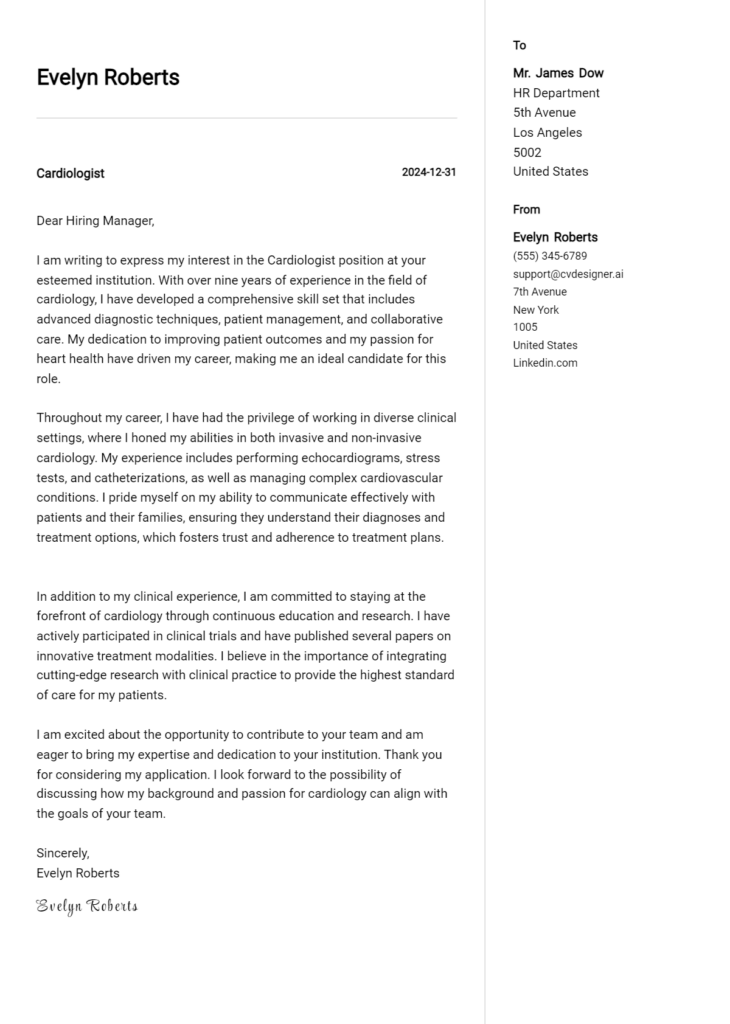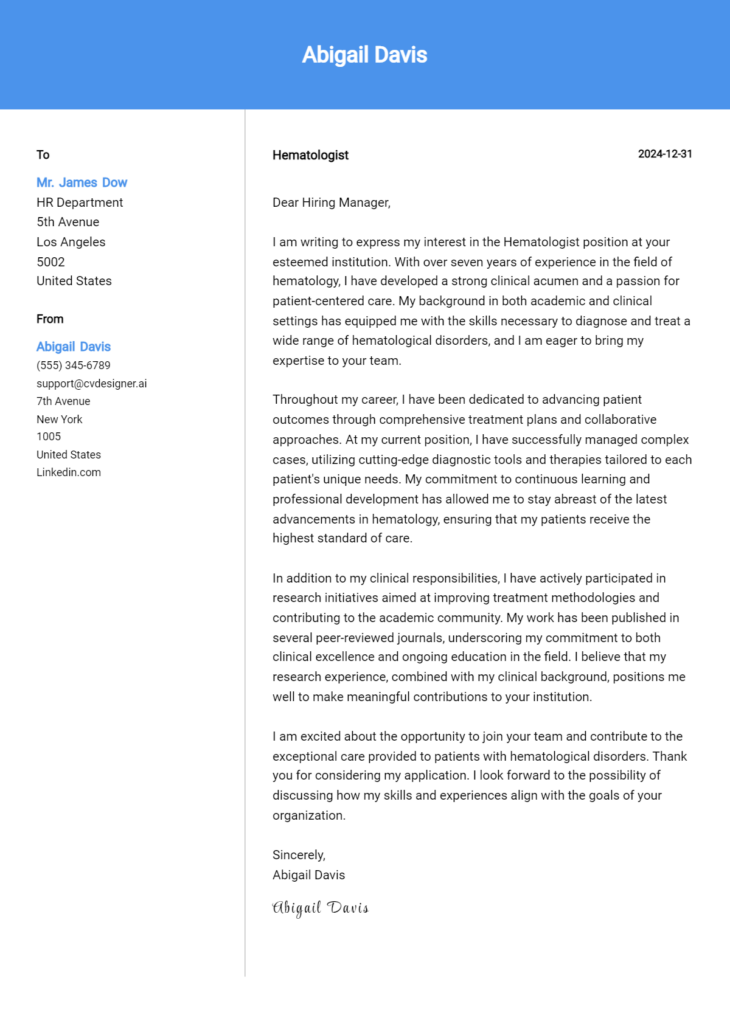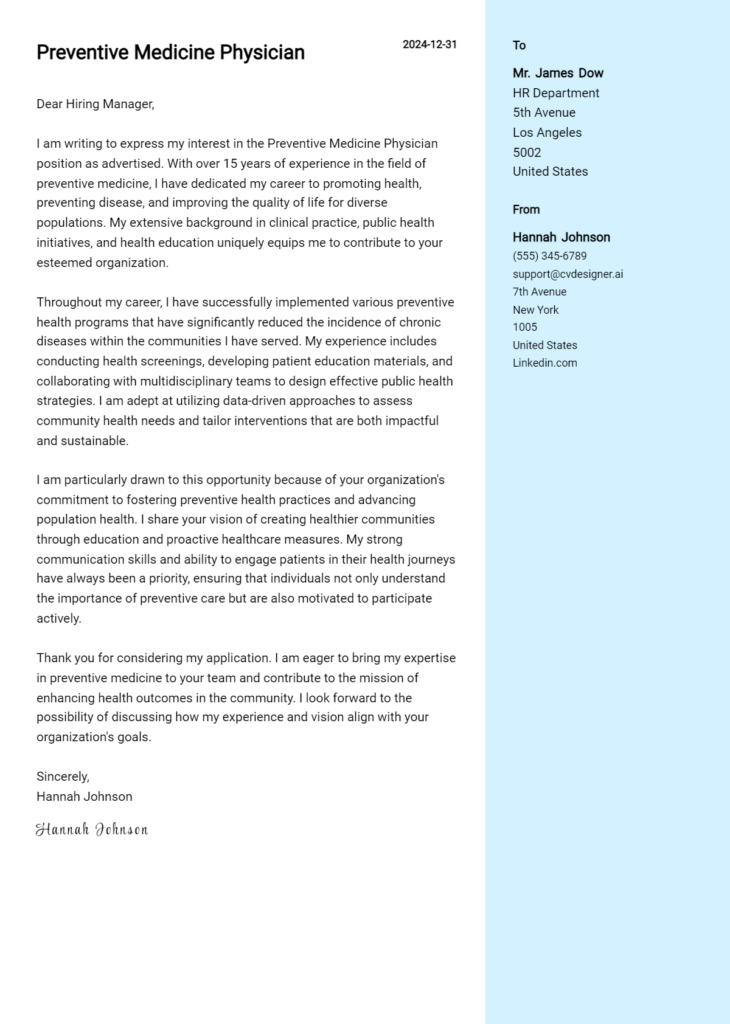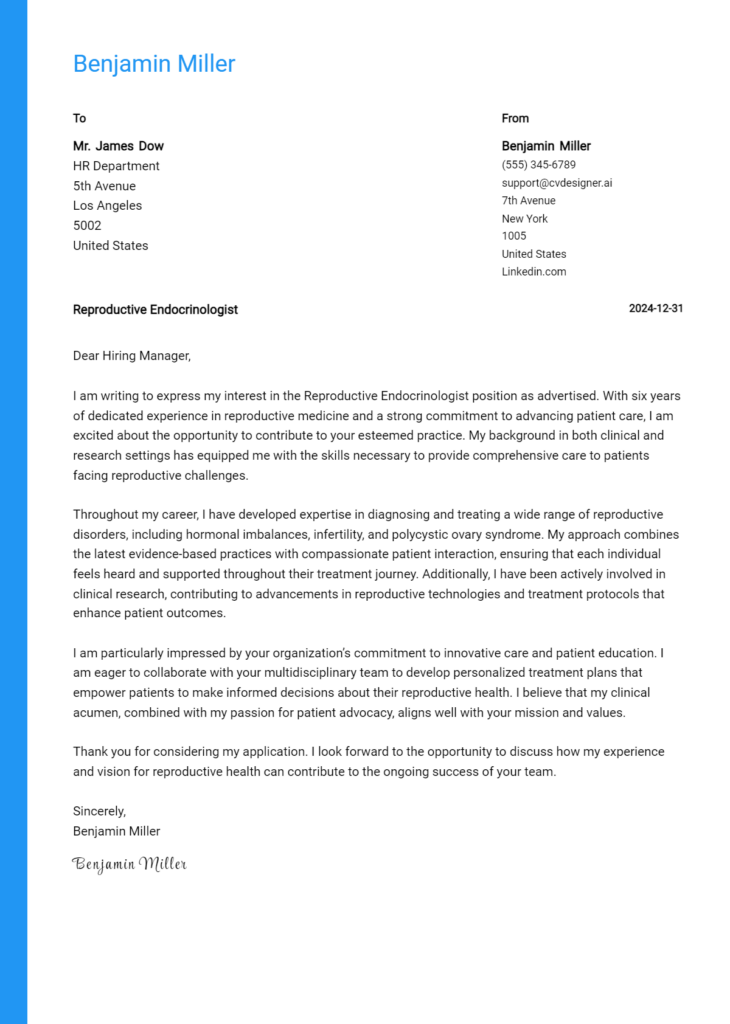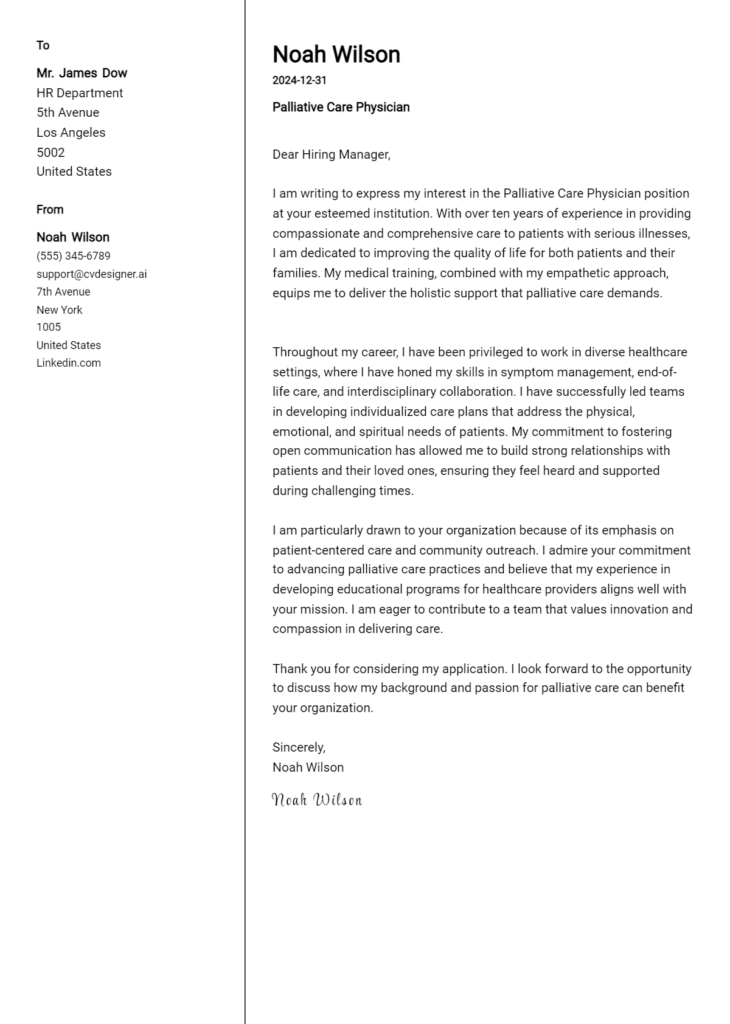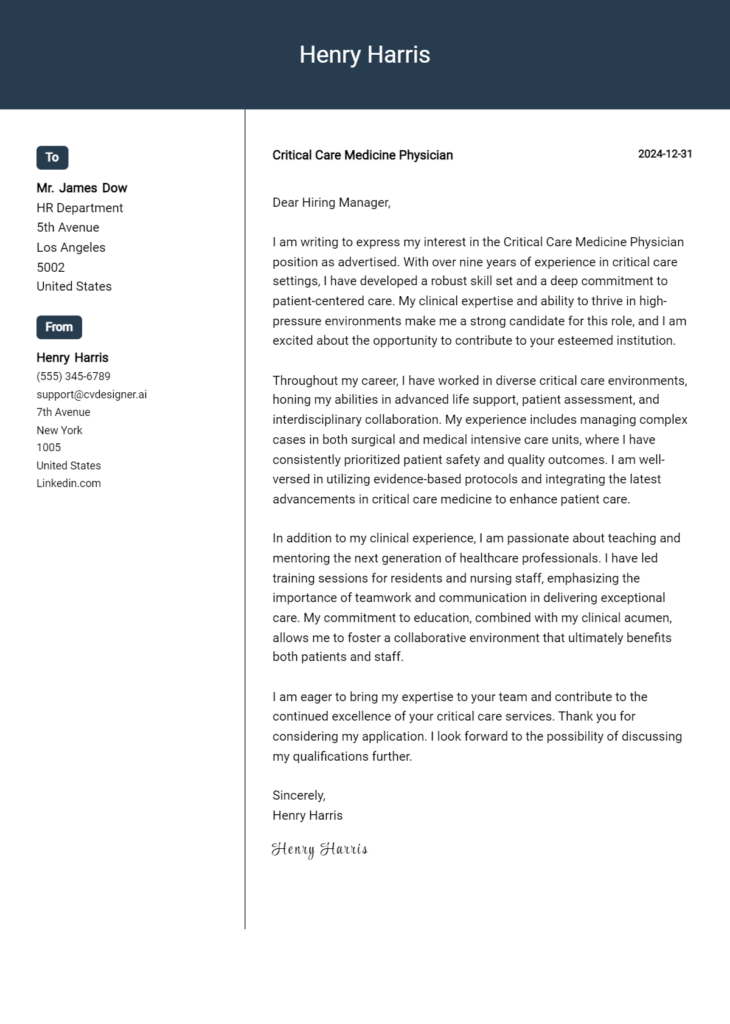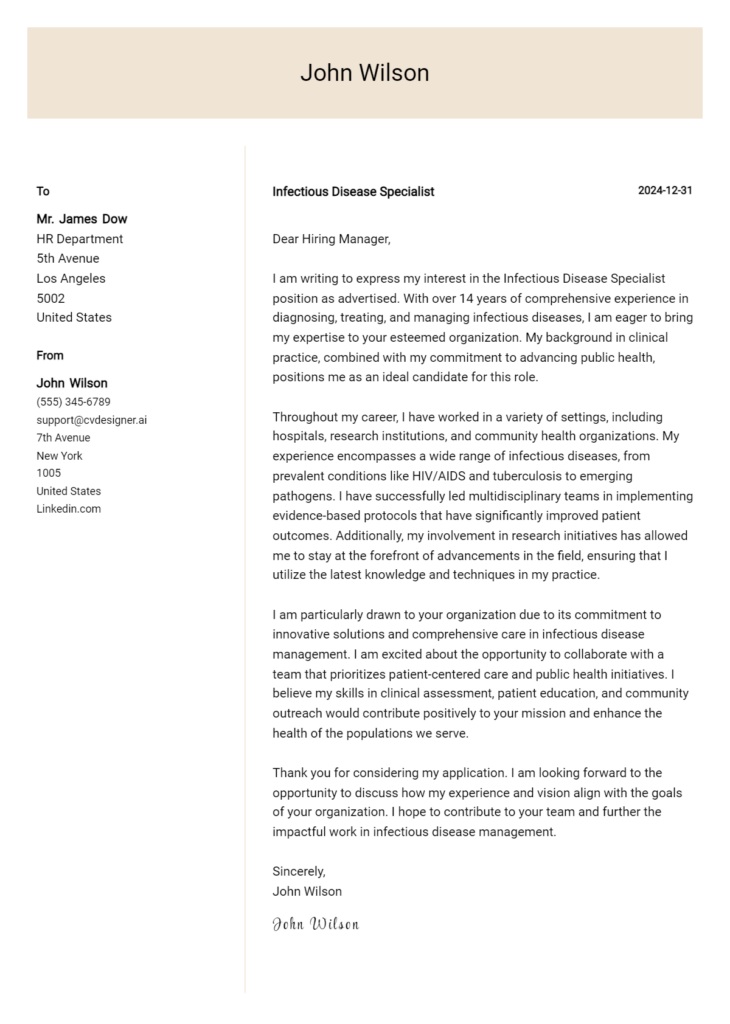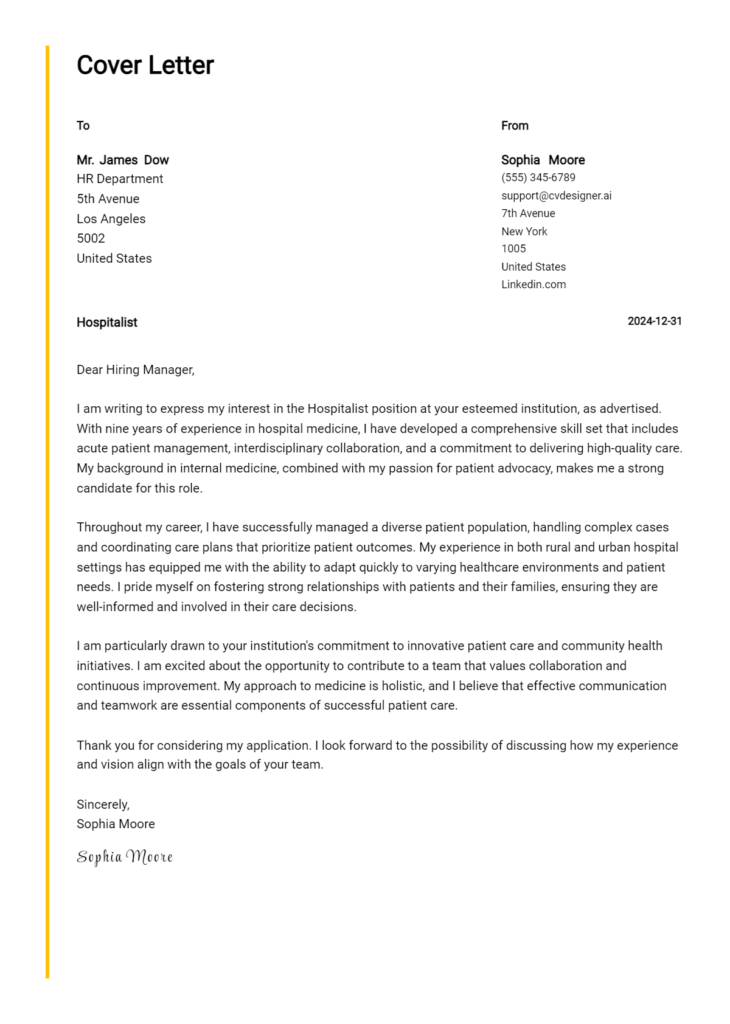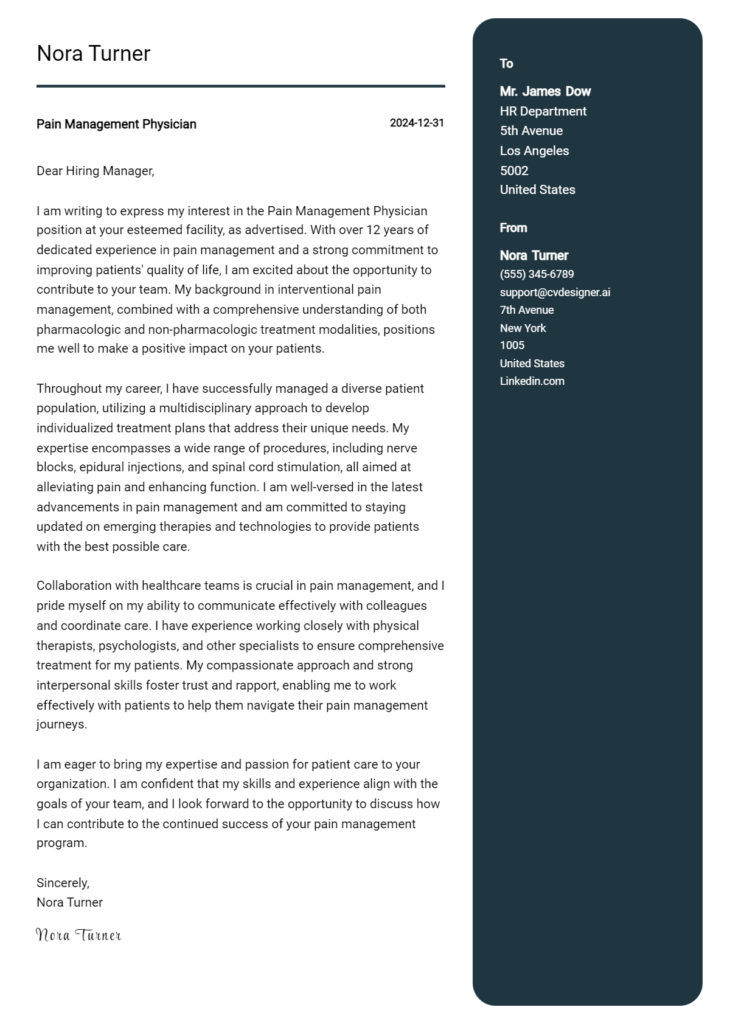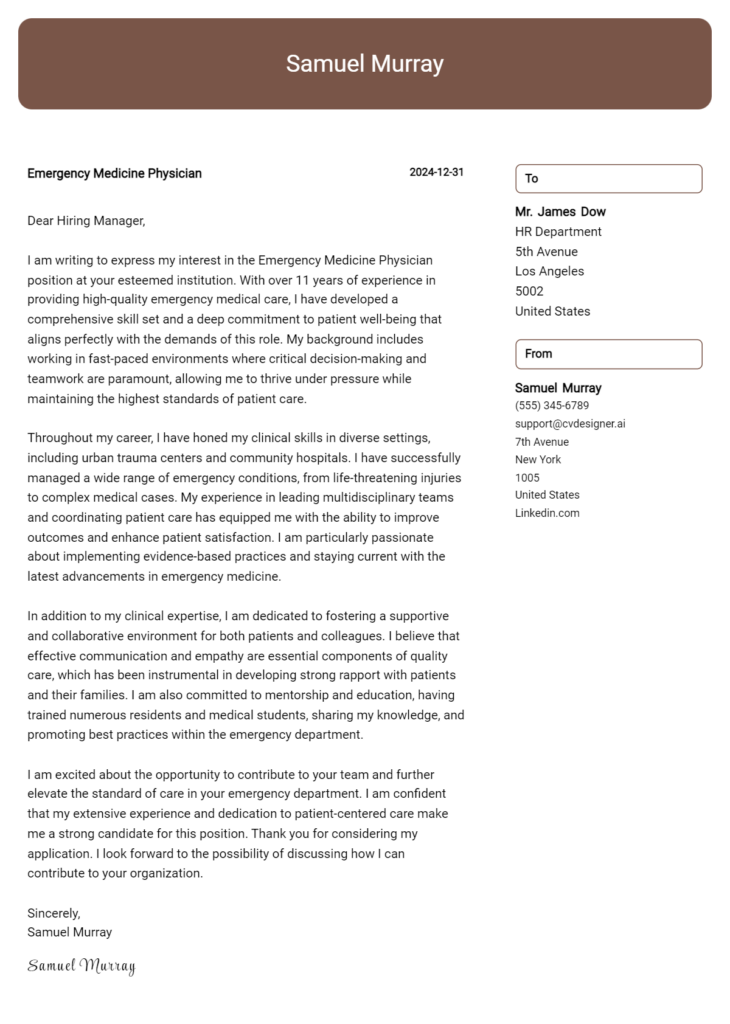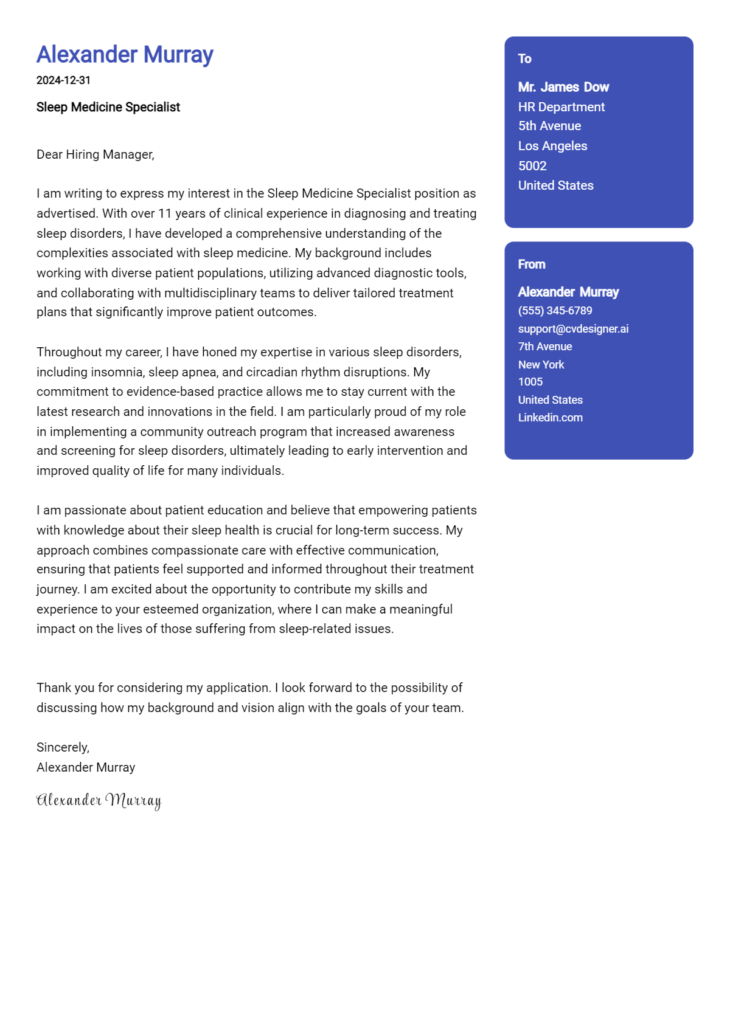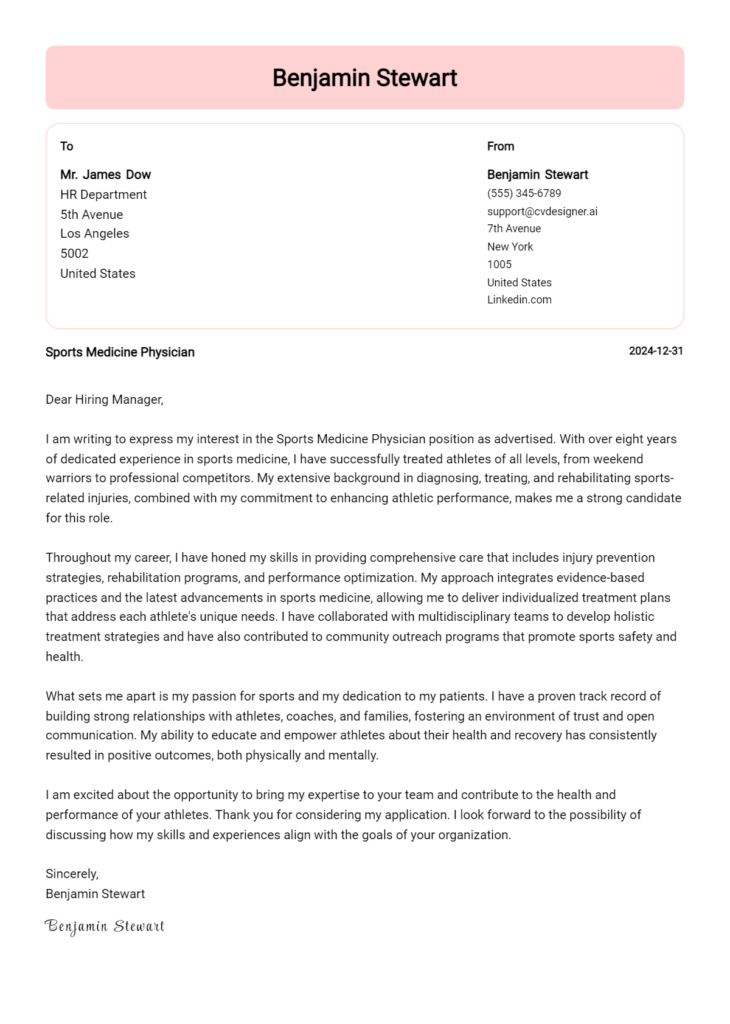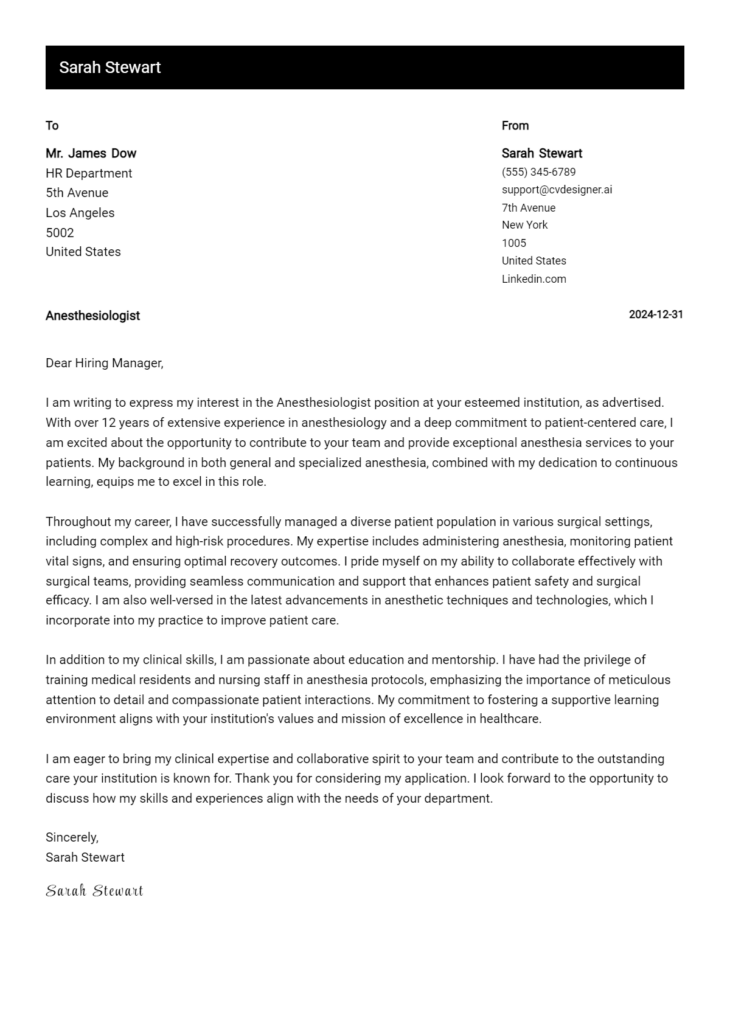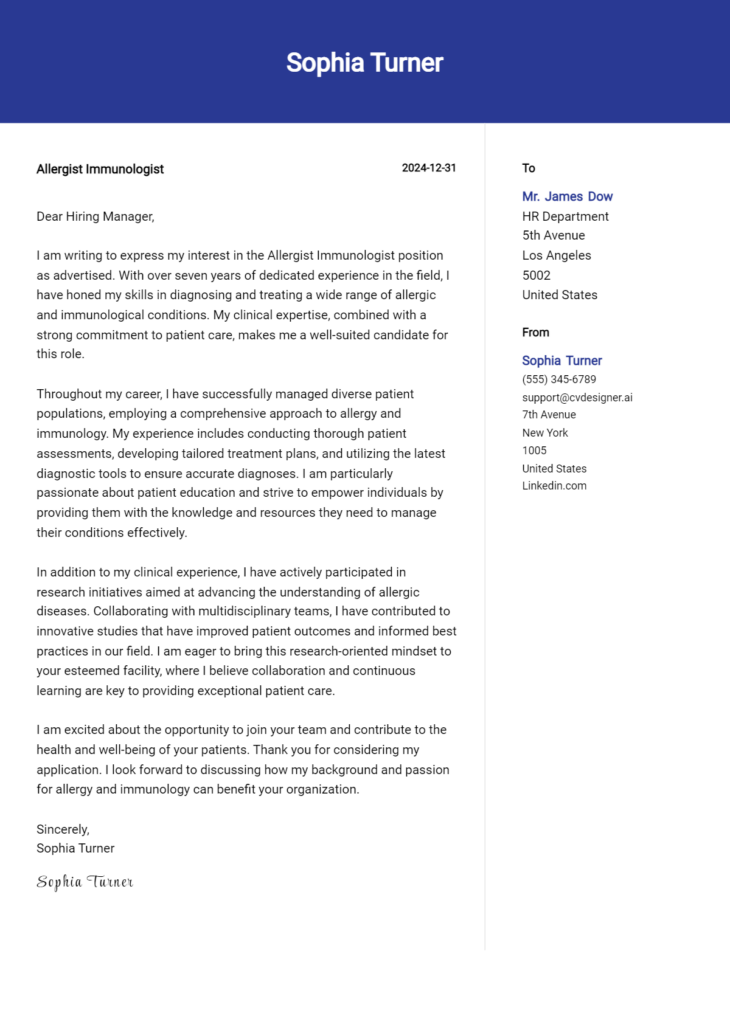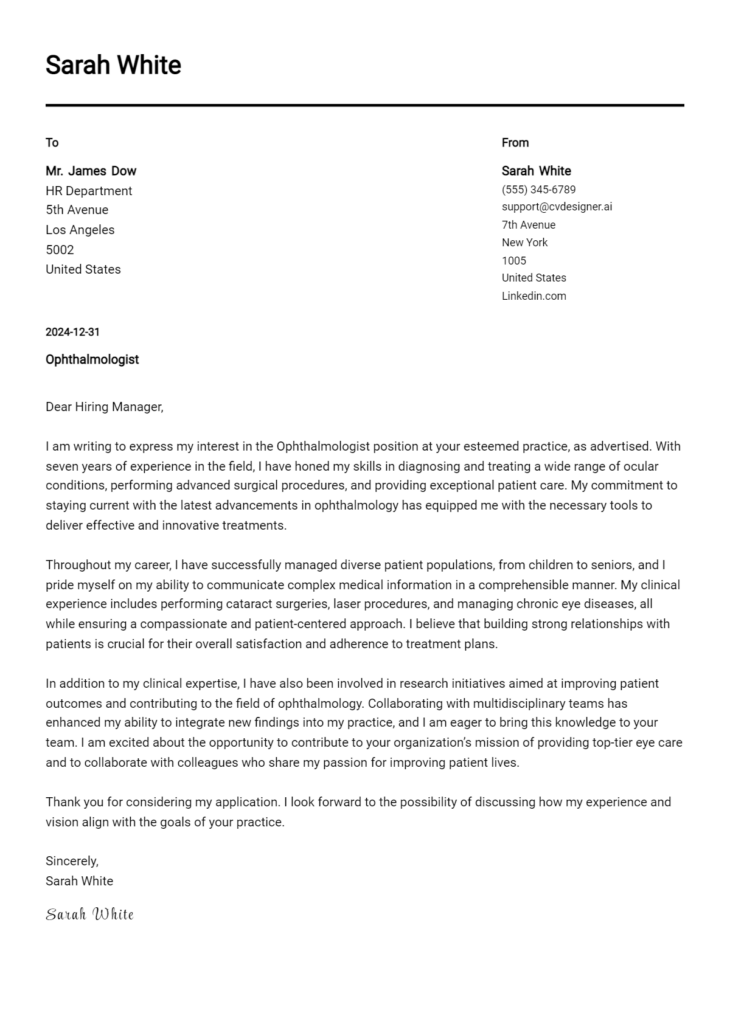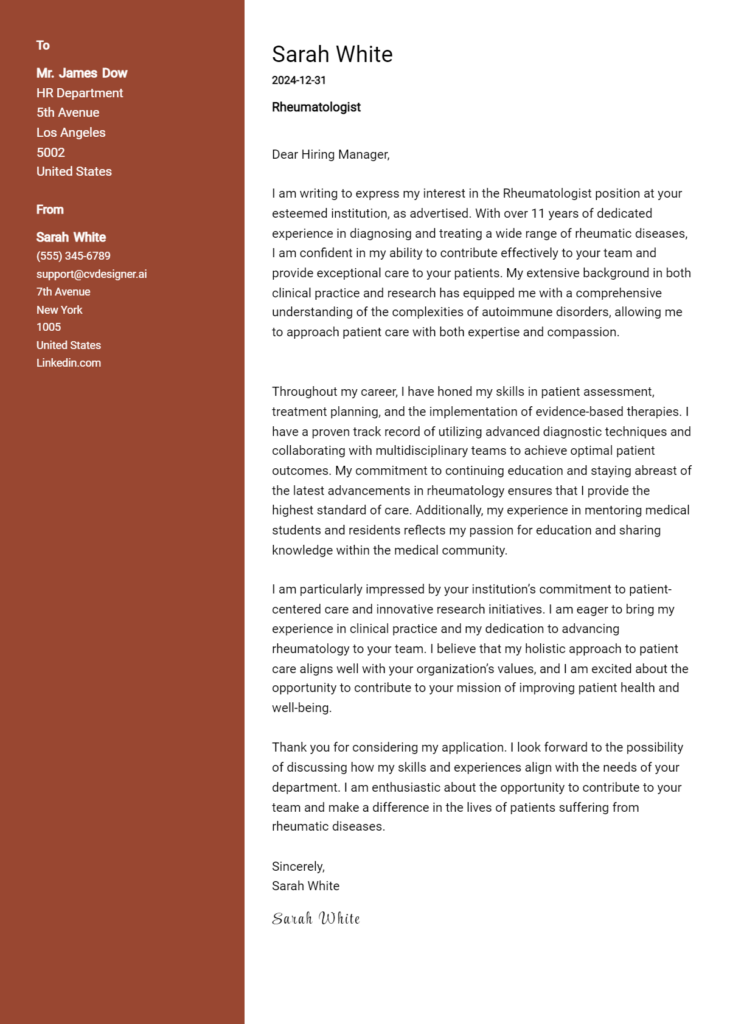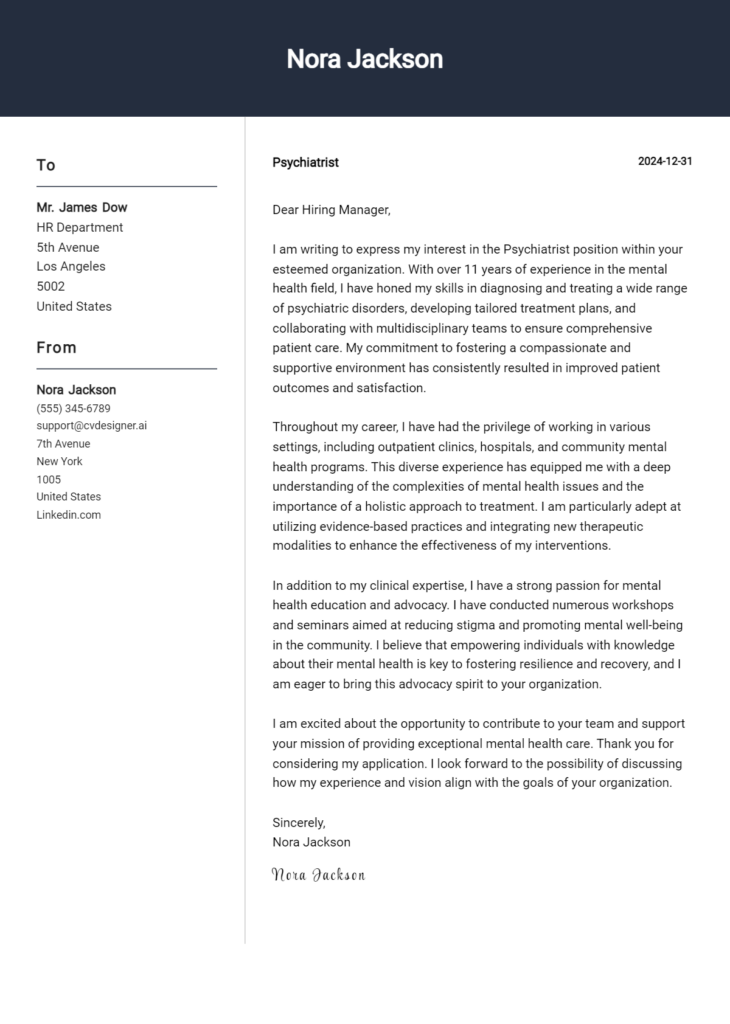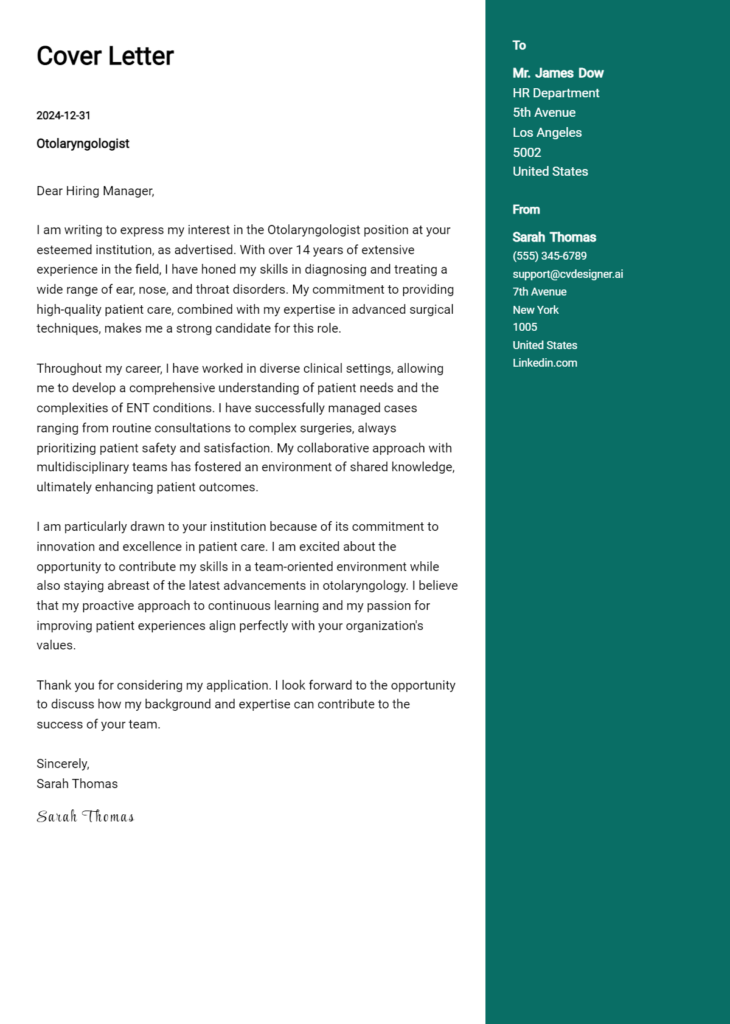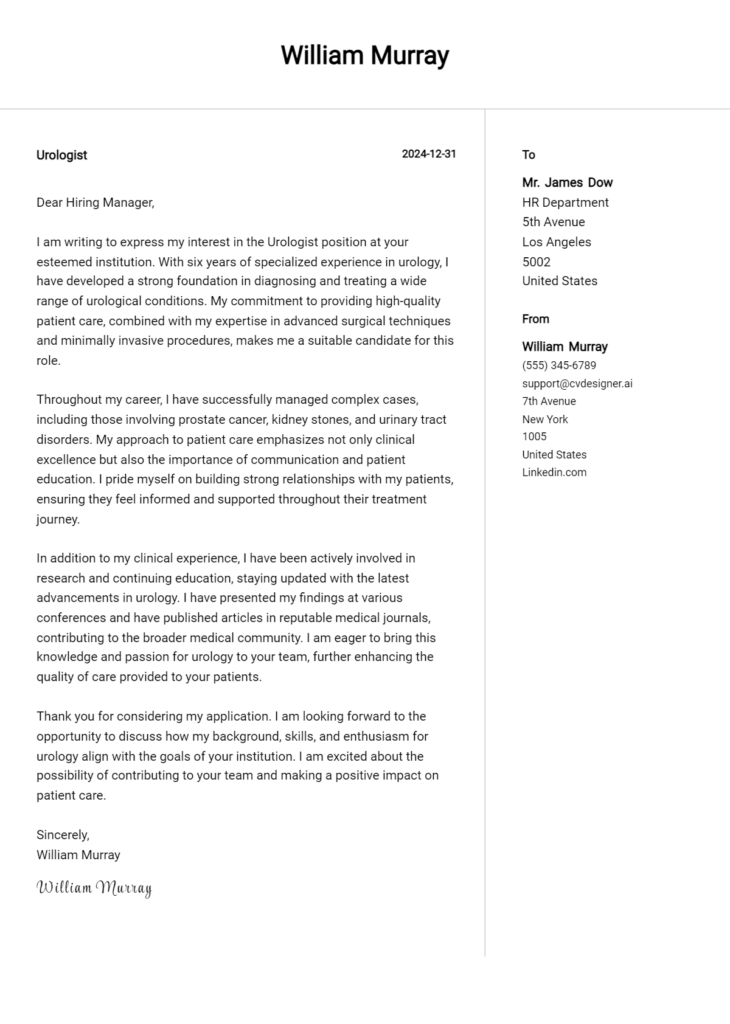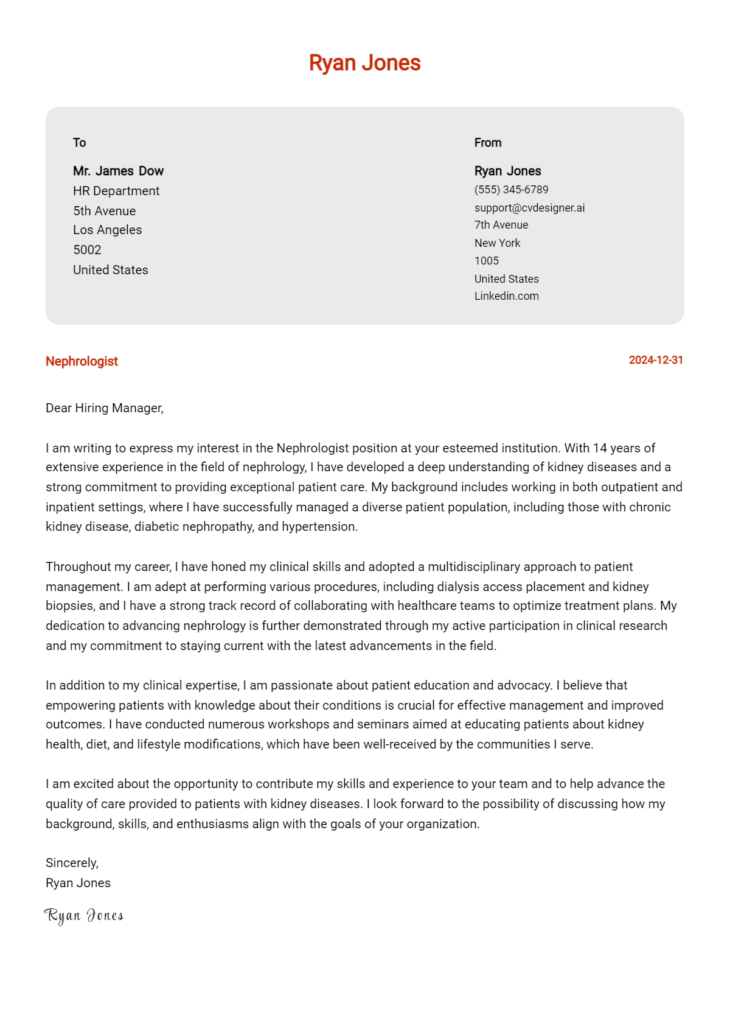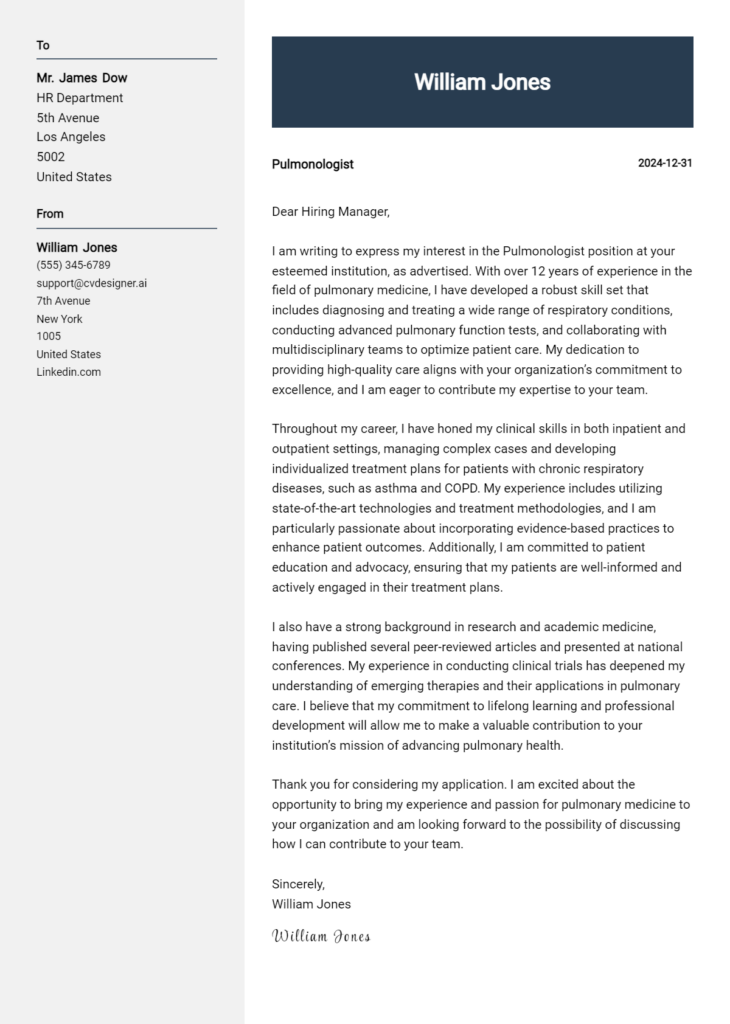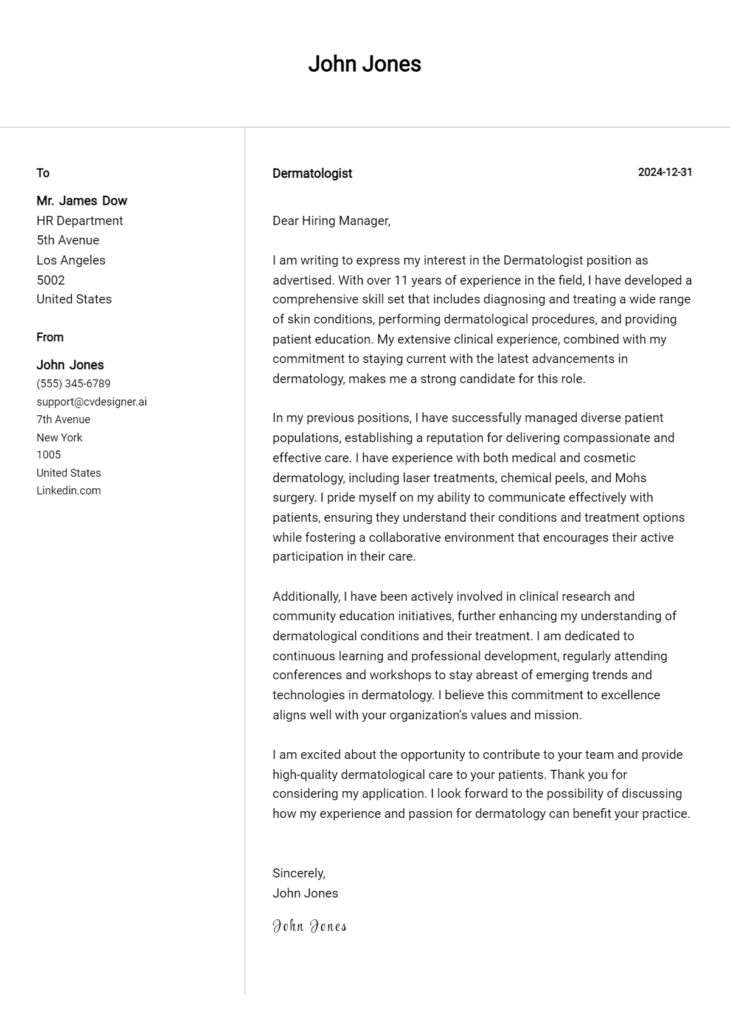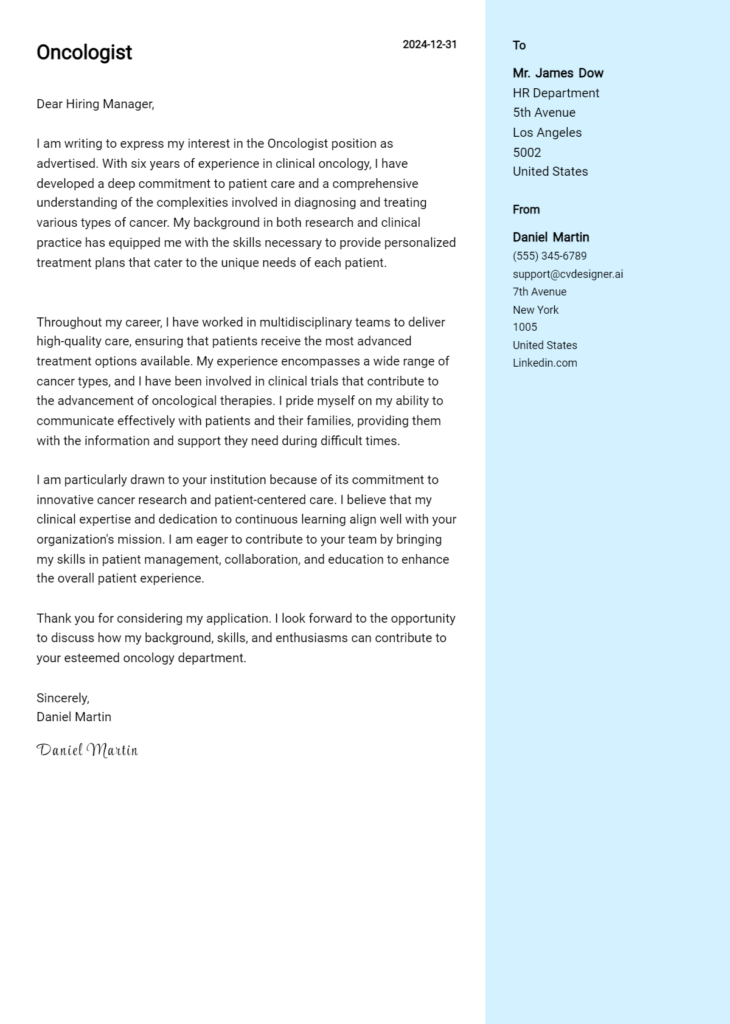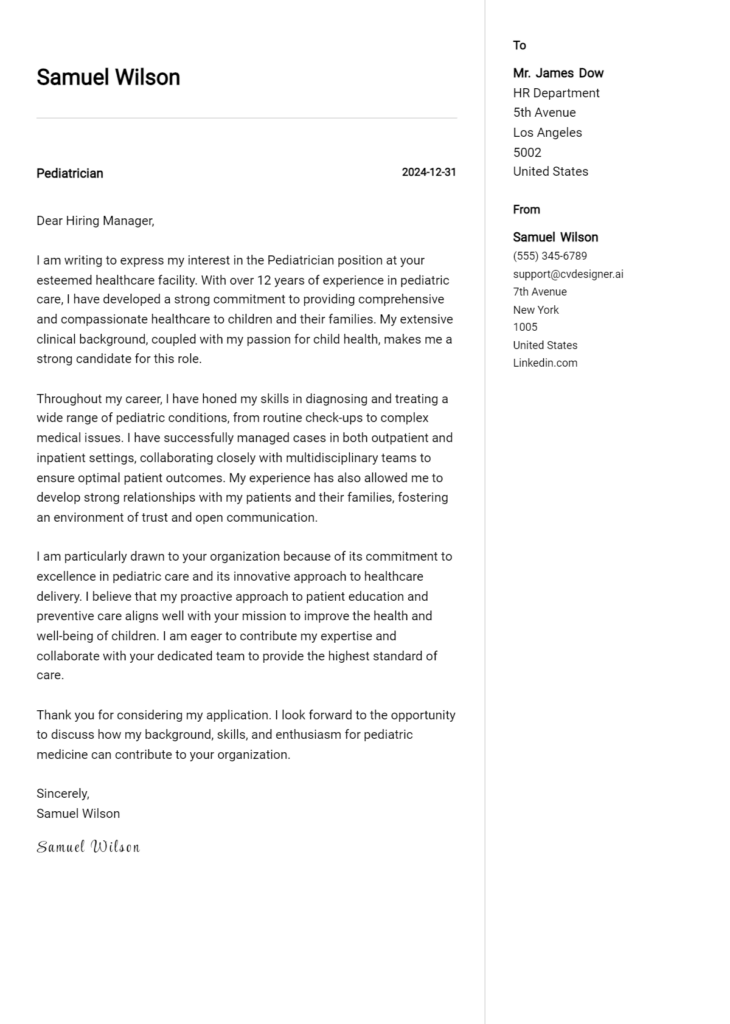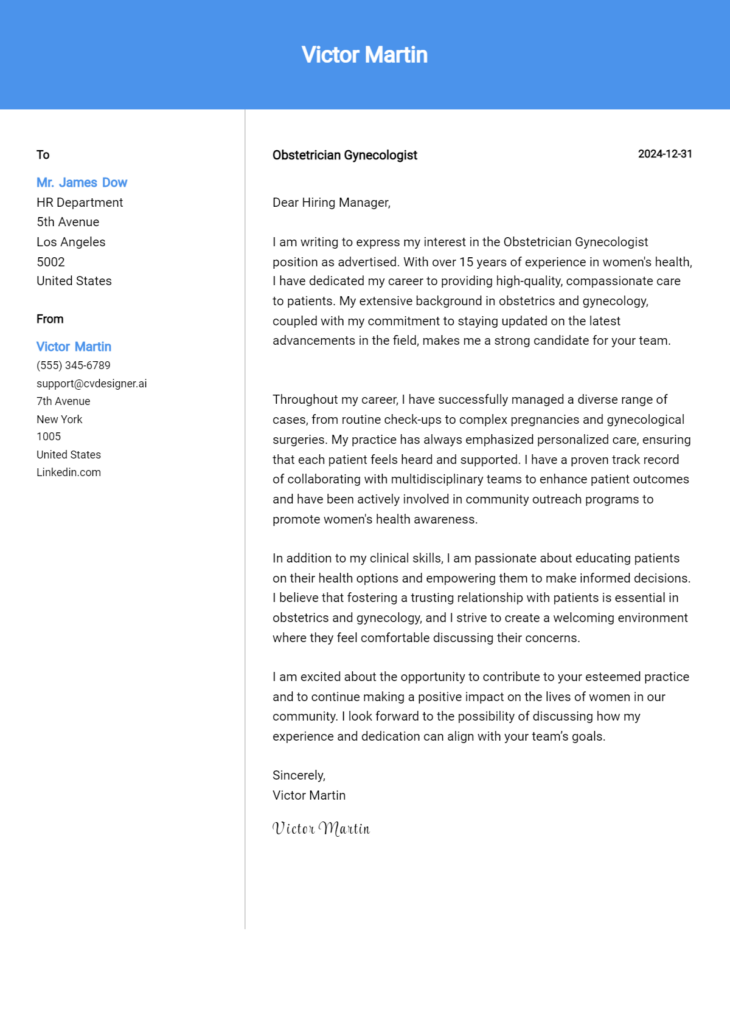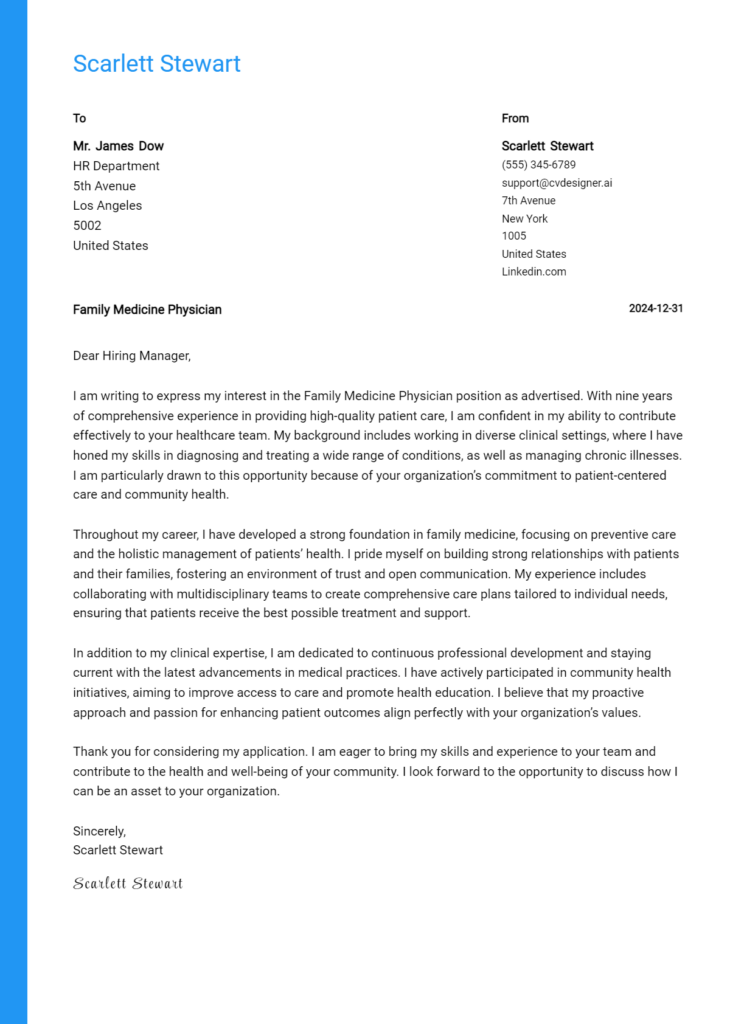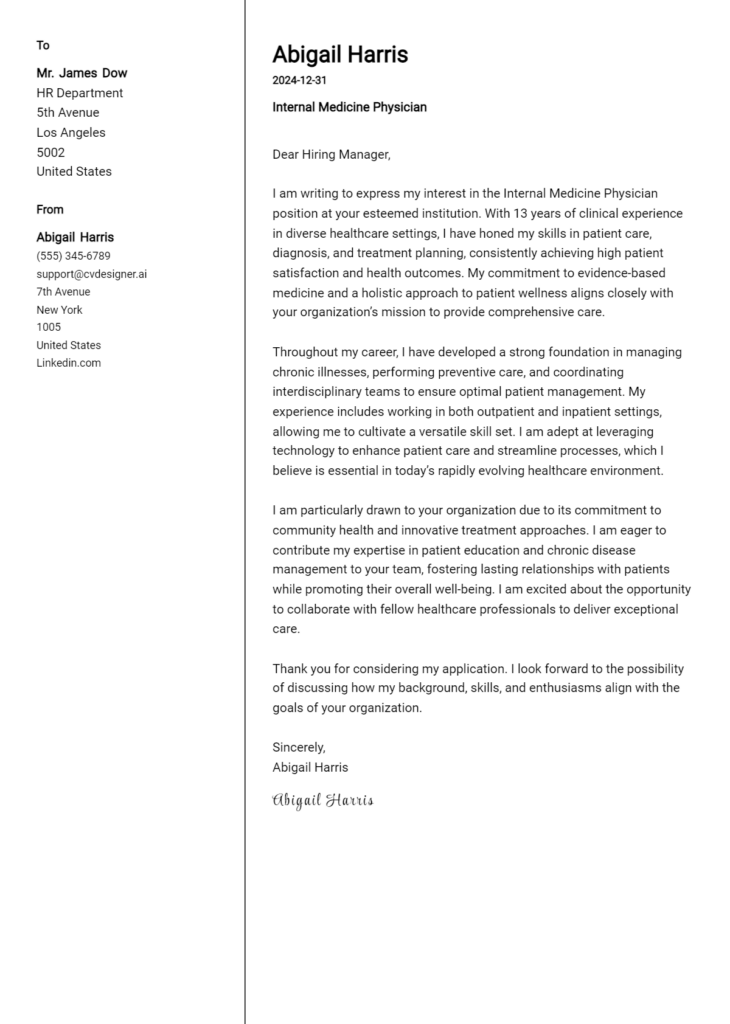General Practitioner Cover Letter Examples
Explore additional General Practitioner cover letter samples and guides and see what works for your level of experience or role.
How to Format a General Practitioner Cover Letter?
Crafting a compelling cover letter is essential for General Practitioners, as it serves as your first opportunity to convey your clinical expertise and patient-centered approach to potential employers. The way you format your cover letter not only reflects your professionalism but also demonstrates your communication skills, which are vital in the medical field. A well-structured cover letter can effectively capture the hiring manager's attention, showcasing your qualifications and dedication to patient care.
In this guide, we'll explore the key components of a successful General Practitioner cover letter, providing insights and examples tailored specifically for the medical profession.
We'll focus on the essential elements of a professional cover letter, including:
- Cover Letter Header
- Cover Letter Greeting
- Cover Letter Introduction
- Cover Letter Body
- Cover Letter Closing
Each section is crucial in emphasizing your qualifications and commitment to healthcare. Let’s delve into each part and learn how to make your General Practitioner cover letter truly stand out.
Importance of the Cover Letter Header for a General Practitioner
A well-crafted cover letter header is crucial for a General Practitioner as it sets the tone for the rest of the application and establishes a professional image. The header should include essential contact information, such as the applicant's name, address, phone number, and email, along with the date and the recipient's details (name, title, organization, and address). Clarity and professionalism in the header not only reflect the applicant's attention to detail but also make it easier for potential employers to reach out. A strong header conveys competence and readiness for the responsibilities of a General Practitioner, while a weak header can create a negative first impression.
Strong Example
Dr. Jane Smith 123 Health Lane Wellness City, CA 90210 (555) 123-4567 janesmith@email.com October 1, 2023 Dr. John Doe Chief of Staff Healthcare Center 456 Care Blvd Wellness City, CA 90210
Weak Example
Jane S. 1234 St. City, ST 555-555-5555 10/1/23 To Whom It May Concern
The Importance of the Cover Letter Greeting
The greeting of a cover letter plays a crucial role in setting the tone for the entire document. It serves as the first impression of your professionalism and attention to detail, signaling to the hiring manager that you are genuinely interested in the position. By addressing the recipient directly, you personalize your application, demonstrating that you have taken the time to research the organization and its staff. Avoiding generic greetings, such as "To Whom It May Concern," can enhance your letter's impact, while a well-crafted greeting can foster a connection with the reader. If you’re unsure of the hiring manager's name, a bit of research through the company's website or LinkedIn can provide valuable information.
Strong Greeting Example
Dear Dr. Smith,
Weak Greeting Example
To Whom It May Concern,
The Importance of a Well-Crafted Cover Letter Introduction for a General Practitioner
A well-crafted cover letter introduction is crucial for a General Practitioner (GP) seeking to make a strong impression on a hiring manager. This opening paragraph serves as the candidate's first opportunity to capture attention, highlight their passion for the role, and succinctly present key skills or achievements that align with the position. A compelling introduction can set the tone for the rest of the cover letter, establishing the candidate as a strong contender for the job. Conversely, a weak introduction may fail to engage the reader, leaving a less favorable impression. Below are examples of strong and weak cover letter introductions for a General Practitioner.
Strong Example
Dear [Hiring Manager's Name], I am writing to express my enthusiasm for the General Practitioner position at [Clinic/Hospital Name], as advertised. With over five years of experience in providing comprehensive patient care and a strong commitment to promoting community health, I am excited about the opportunity to contribute to your esteemed team. My background in preventive medicine and patient education has not only enhanced my clinical skills but has also allowed me to build lasting relationships with patients, ensuring their overall well-being and satisfaction.
Weak Example
To whom it may concern, I want to apply for the General Practitioner job you have available. I have some experience in the field. I think I could be a good fit for your clinic.
Purpose of the Cover Letter Body for a General Practitioner
The cover letter body for a General Practitioner serves as a critical platform for candidates to articulate their qualifications, experiences, and the unique value they bring to a healthcare organization. It allows applicants to highlight specific projects or accomplishments that demonstrate their clinical skills, patient care philosophy, and ability to work collaboratively within a medical team. By effectively showcasing these attributes, candidates can set themselves apart from others and make a strong case for their suitability for the role.
Strong Example
I am a dedicated General Practitioner with over eight years of experience in a community health setting, where I successfully implemented a chronic disease management program that improved patient outcomes by 25%. My commitment to patient education and preventive care has led to a significant increase in patient engagement, as evidenced by a 30% rise in follow-up appointments within my practice. I have also collaborated with a multidisciplinary team to streamline patient referrals, reducing wait times by 15%. With my strong clinical skills and a passion for enhancing patient care, I am eager to bring my expertise to your esteemed practice.
Weak Example
I have worked as a General Practitioner for several years. I am good at my job and have seen many patients. I think I would be a good fit for your practice. I have some experience with different procedures and a few positive reviews from patients. I hope to contribute to your team.
Importance of the Cover Letter Closing for a General Practitioner
The closing paragraph of a cover letter is crucial as it serves to summarize the applicant's qualifications, reiterate their enthusiasm for the role, and encourage the hiring manager to take the next step, whether that be reviewing the resume or scheduling an interview. A strong closing leaves a lasting impression, reinforcing the candidate’s suitability for the position and their eagerness to contribute to the practice. In contrast, a weak closing may lack specificity and fail to convey genuine interest, which can diminish the overall impact of the application.
Strong Example
I am excited about the opportunity to bring my expertise as a General Practitioner to your esteemed practice. With over five years of experience in patient care, coupled with my commitment to community health, I am confident in my ability to make a positive impact on your team. I look forward to the possibility of discussing how my skills align with your needs and would appreciate the opportunity to further discuss my application in an interview. Thank you for considering my candidacy; I have attached my resume for your review.
Weak Example
Thank you for reading my cover letter. I hope you consider me for the position. I think I would be okay at the job. Please look at my resume if you want to see more about my background.
Crafting an effective cover letter is essential for candidates aspiring to become a General Practitioner. This document serves not only as an introduction to your professional experience but also as a platform to highlight your technical skills, problem-solving abilities, teamwork, and passion for continuous learning. By showcasing these attributes, you can set yourself apart from other candidates. Below are some tips to help you create a compelling cover letter that resonates with potential employers.
Tips for Writing a Cover Letter as a General Practitioner
Highlight Your Technical Skills
Detail your clinical skills and medical expertise relevant to the position. Use specific examples to demonstrate your proficiency in diagnostics, treatment planning, and patient care. Mention any specialized training or certifications that align with the job description, emphasizing your ability to deliver high-quality healthcare.Showcase Problem-Solving Abilities
Illustrate your capacity to diagnose and manage complex medical conditions. Share anecdotes about challenging cases you have successfully handled, highlighting your analytical thinking and decision-making skills. This will convey your ability to think critically under pressure and your commitment to patient outcomes.Emphasize Teamwork and Collaboration
Healthcare is inherently collaborative, so it's crucial to highlight your experience working within multidisciplinary teams. Discuss your role in fostering cooperative relationships with other healthcare professionals, as well as your ability to communicate effectively with colleagues and patients. Include experiences that demonstrate your leadership and mentorship abilities.Demonstrate Your Knowledge of the SDLC
While the Software Development Life Cycle (SDLC) is more commonly associated with IT roles, understanding its principles can be beneficial in medical practice, especially with the increasing reliance on health informatics. Mention any experience you may have with electronic health records (EHR) systems, patient management software, or data analysis tools that improve patient care processes.Express Your Passion for Continuous Learning
The medical field is constantly evolving, and your commitment to lifelong learning is an asset. Mention any recent courses, workshops, or certifications you have pursued that enhance your medical knowledge and skills. This shows prospective employers that you are proactive about keeping up with the latest advancements in healthcare.
By following these tips, you can create a powerful cover letter that effectively communicates your qualifications as a General Practitioner. For additional resources, consider using cover letter templates or a cover letter builder to streamline the writing process.
Common Mistakes to Avoid in a General Practitioner Cover Letter
Avoiding common mistakes in your cover letter is crucial for making a strong impression as a General Practitioner. A well-crafted cover letter can set you apart from other candidates, while errors can undermine your professionalism. Here are some common mistakes to steer clear of:
Generic Greetings: Using "To Whom It May Concern" can make your letter feel impersonal. Address the hiring manager by name whenever possible.
Lack of Specificity: Failing to tailor your letter to the specific job can make it seem like a template. Highlight your relevant experience and skills that match the job description.
Excessive Length: A cover letter should be concise—ideally one page. Avoid rambling; focus on key points that showcase your qualifications.
Overlooking Formatting: Poor formatting can make your cover letter difficult to read. Use a cover letter format that is professional and easy on the eyes.
Neglecting Proofreading: Spelling and grammatical errors can be detrimental. Always proofread your letter or have someone else review it to catch mistakes.
Focusing Too Much on Responsibilities: Instead of listing job duties, emphasize your accomplishments and how they benefited your previous employers.
Ignoring the Call to Action: Failing to reiterate your enthusiasm for the role and inviting the employer to contact you can leave your letter feeling incomplete.
By avoiding these pitfalls and referring to cover letter examples for inspiration, you can create a compelling cover letter that enhances your chances of landing an interview.
Cover Letter FAQs for General Practitioner
What should I include in my cover letter as a General Practitioner?
Your cover letter should include a brief introduction, your relevant qualifications, and your motivations for applying to the specific practice. Start by stating your name and the position you are applying for. Highlight your medical degree, board certifications, and any specialized training. Discuss your clinical experience, focusing on areas relevant to the practice. Mention your commitment to patient care and how your values align with the practice’s philosophy. Finally, express enthusiasm for the opportunity and a desire to contribute positively to the team.
How can I showcase my skills and experience effectively?
To showcase your skills and experience effectively, use specific examples that demonstrate your capabilities. Instead of merely listing qualifications, narrate a brief story about a challenging case you handled or a successful patient outcome you've achieved. Highlight how these experiences have shaped your approach to patient care and teamwork. Additionally, emphasize soft skills such as communication, empathy, and adaptability. Tailor your examples to match the job description, addressing how your skills align with the practice's needs and values.
How long should my cover letter be?
Your cover letter should be concise, ideally one page long, with a clear structure. Aim for three to four paragraphs that cover your introduction, qualifications, specific experiences, and a closing statement. This length allows you to provide enough detail to pique the employer's interest without overwhelming them. Be mindful of formatting and readability; use clear language and avoid jargon. Each paragraph should focus on a single idea, ensuring that your message is easy to follow and effectively communicates your enthusiasm for the role.
Should I address my cover letter to a specific person?
Yes, addressing your cover letter to a specific person is highly recommended. Doing so demonstrates that you have taken the time to research the practice and shows genuine interest in the position. If the job posting includes a contact name, use it in your salutation. If not, visit the practice's website or call their office to inquire. Avoid generic salutations like "To Whom It May Concern," as they can come off as impersonal. A personalized greeting can make a positive impression and increase the likelihood of your application being noticed.
Build your Cover Letter in minutes
Use an AI-powered cover letter builder and have your letter done in 5 minutes. Just select your template and our software will guide you through the process.

